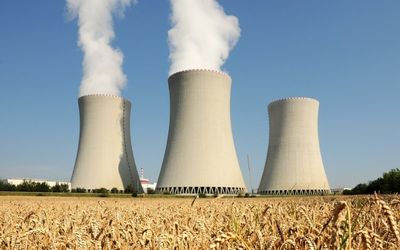Lack of nuclear transparency a cause for concern
by Andrew Molver,
2016-03-24 05:45:08.0
IT IS estimated that SA’s new nuclear-build programme for the procurement of multiple nuclear power plants to generate 9,600MW of electricity will cost between R500bn and R1-trillion, making it the country’s most expensive procurement to date. Uncertainties pertaining to the legality of the procurement process stand to delay and potentially derail its implementation.
Section 217(1) of the Constitution requires a procurement process to be fair, equitable, transparent, competitive and cost-effective. It is generally accepted that to procure goods or services in a manner that complies with the aforesaid constitutional principles, such procurement must be done by way of an open, competitive, public tender process. However, there have been no positive assurances that the government will follow such a tender process for the procurement of the proposed nuclear power plants. So far, the government has been involved in what it terms a "preliminary phase of the procurement process" by entering into inter-governmental agreements (IGAs) with various nuclear vendor countries to "lay the foundation for co-operation, trade and exchange of nuclear technology as well as procurement". To date, the country has entered into agreements with Russia, France, China, the US and South Korea, with further agreements pending with Canada as well as Japan.
The contents of the Russian IGA (which was leaked to the public) indicate an intention to adopt a "government-to-government" procurement process, which is not in line with the constitutional requirements of transparency and competitiveness.
In a confidential presentation to the National Nuclear Energy Executive Co-ordination Committee, the Department of Energy also recommended a closed, government-to-government procurement process. On December 7, at its last meeting of last year, Cabinet officially took the decision to procure 9,600MW of nuclear electricity by issuing a request for proposals (RFP). This decision was not disclosed by Minister in the Presidency Jeff Radebe in his post-Cabinet meeting media statement. The decision was made public only on December 21, when the energy ministry published a determination in the Government Gazette officially authorising it to procure the nuclear electricity.
The determination states that such electricity shall be procured through tendering procedures that are fair, equitable, transparent, competitive and cost-effective, and indicates that the Department of Energy will be the procuring entity (not Eskom).
Interestingly, the determination was signed by the former energy minister in November 2013, and by the chairperson of the National Energy Regulator of SA (Nersa) in December 2013, but was only gazetted last December. The decision of the energy minister to utilise a determination signed by her predecessor over two years ago, rather than make a new determination, has raised concerns that this was done to avoid having again to obtain Nersa’s concurrence, which would probably be based on different considerations and policies regarding nuclear energy compared to 2013.
The Department of Energy is now in a position to issue its RFP to potential tenderers, but there has been no indication of when this will occur or whether the contents thereof will be made public. The department has, however, advised that the proposals received will be used to develop a final funding model that will be submitted to Cabinet for its approval. It is also uncertain whether the proposals or funding model will be disclosed to the public.
The lack of transparency and ostensible procedural irregularities by the government thus far raise serious concerns, from both a legal and a public interest perspective, as to whether a lawful procurement process will be followed. The less transparent the procurement process is, the greater the likelihood of it giving rise to lengthy litigation, either to stop the procurement process at the outset or to set aside any decision to award the contract.
Such proceedings could force the government to recommence the procurement process from the very beginning. Any type of legal challenge will unavoidably delay the implementation of the nuclear-build programme.
• Molver is a partner at Adams & Adams, a founding member of the A&A Public Procurement Law Group

Picture: THINKSTOCK
IT IS estimated that SA’s new nuclear-build programme for the procurement of multiple nuclear power plants to generate 9,600MW of electricity will cost between R500bn and R1-trillion, making it the country’s most expensive procurement to date. Uncertainties pertaining to the legality of the procurement process stand to delay and potentially derail its implementation.
Section 217(1) of the Constitution requires a procurement process to be fair, equitable, transparent, competitive and cost-effective. It is generally accepted that to procure goods or services in a manner that complies with the aforesaid constitutional principles, such procurement must be done by way of an open, competitive, public tender process. However, there have been no positive assurances that the government will follow such a tender process for the procurement of the proposed nuclear power plants. So far, the government has been involved in what it terms a "preliminary phase of the procurement process" by entering into inter-governmental agreements (IGAs) with various nuclear vendor countries to "lay the foundation for co-operation, trade and exchange of nuclear technology as well as procurement". To date, the country has entered into agreements with Russia, France, China, the US and South Korea, with further agreements pending with Canada as well as Japan.
The contents of the Russian IGA (which was leaked to the public) indicate an intention to adopt a "government-to-government" procurement process, which is not in line with the constitutional requirements of transparency and competitiveness.
In a confidential presentation to the National Nuclear Energy Executive Co-ordination Committee, the Department of Energy also recommended a closed, government-to-government procurement process. On December 7, at its last meeting of last year, Cabinet officially took the decision to procure 9,600MW of nuclear electricity by issuing a request for proposals (RFP). This decision was not disclosed by Minister in the Presidency Jeff Radebe in his post-Cabinet meeting media statement. The decision was made public only on December 21, when the energy ministry published a determination in the Government Gazette officially authorising it to procure the nuclear electricity.
The determination states that such electricity shall be procured through tendering procedures that are fair, equitable, transparent, competitive and cost-effective, and indicates that the Department of Energy will be the procuring entity (not Eskom).
Interestingly, the determination was signed by the former energy minister in November 2013, and by the chairperson of the National Energy Regulator of SA (Nersa) in December 2013, but was only gazetted last December. The decision of the energy minister to utilise a determination signed by her predecessor over two years ago, rather than make a new determination, has raised concerns that this was done to avoid having again to obtain Nersa’s concurrence, which would probably be based on different considerations and policies regarding nuclear energy compared to 2013.
The Department of Energy is now in a position to issue its RFP to potential tenderers, but there has been no indication of when this will occur or whether the contents thereof will be made public. The department has, however, advised that the proposals received will be used to develop a final funding model that will be submitted to Cabinet for its approval. It is also uncertain whether the proposals or funding model will be disclosed to the public.
The lack of transparency and ostensible procedural irregularities by the government thus far raise serious concerns, from both a legal and a public interest perspective, as to whether a lawful procurement process will be followed. The less transparent the procurement process is, the greater the likelihood of it giving rise to lengthy litigation, either to stop the procurement process at the outset or to set aside any decision to award the contract.
Such proceedings could force the government to recommence the procurement process from the very beginning. Any type of legal challenge will unavoidably delay the implementation of the nuclear-build programme.
• Molver is a partner at Adams & Adams, a founding member of the A&A Public Procurement Law Group























Change: -0.47%
Change: -0.57%
Change: -1.76%
Change: -0.34%
Change: 0.02%
Data supplied by Profile Data
Change: -1.49%
Change: 0.08%
Change: -0.47%
Change: 0.00%
Change: -0.04%
Data supplied by Profile Data
Change: -0.34%
Change: 0.03%
Change: -0.10%
Change: -0.22%
Change: -0.69%
Data supplied by Profile Data
Change: -0.28%
Change: -1.15%
Change: -0.07%
Change: -1.21%
Change: -0.22%
Data supplied by Profile Data